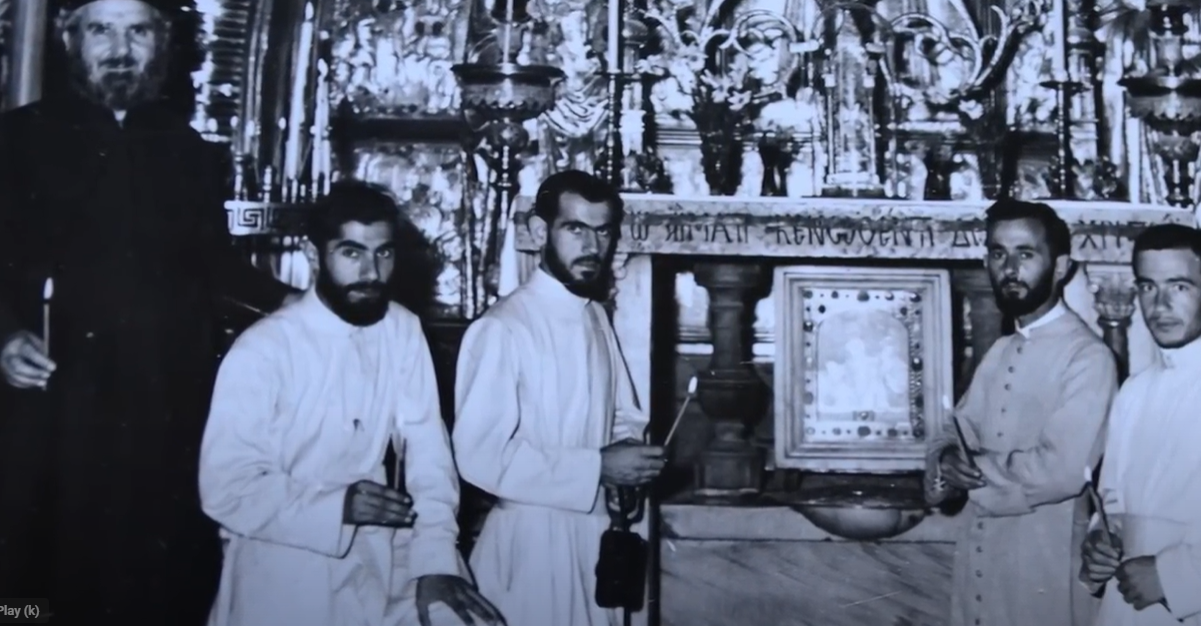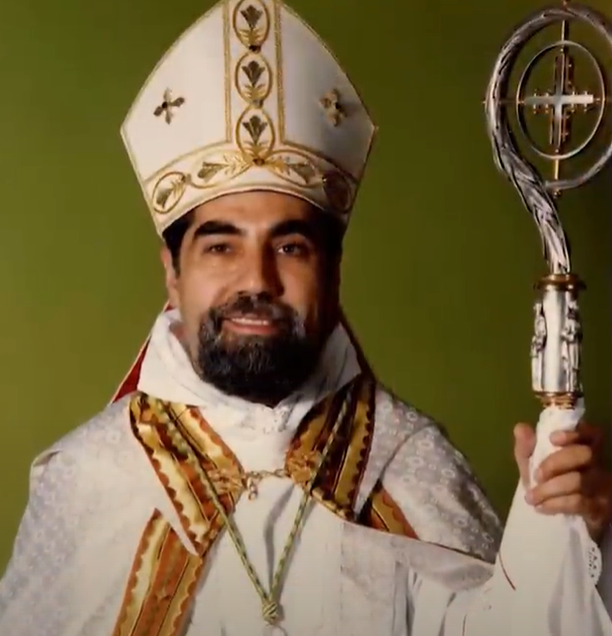A Lifetime of Blessings
Commemorating Bishop Ibrahim’s years of spiritual leadership
Listen to This Story!
By Sarah Kittle
Bishop Ibrahim Ibrahim, born in October 1937 in Iraq, was the fourth child of Namo Mansour Ibrahim and Rammou Hermiz Yono. From an early age, he cherished attending Mass with his family in the vibrant community of Tel Keppe. Reflecting on his childhood, he said, “Our life was very simple in the village. Most people were simple farmers and laborers; there were no companies or major employers.”
He continued, “As children, we went to Mass daily. There were five priests in Tel Keppe at that time, and the main priest would test us to ensure we attended.”
At the age of 14, two seminarians approached him with an invitation to join the Church. His family remained neutral, but a week later, Ibrahim agreed, accepting an invitation to join the Patriarchal Seminary in Mosul. His father paid the 10 Dinar enrollment fee, marking the beginning of a remarkable journey that would lead Ibrahim to become a pivotal leader of the Chaldean Catholic Church in the United States.
Recognizing his intellect and ambition, the seminary sent him to Paris at age 20 to study philosophy and theology. In 1961, he was ordained a deacon in Paris, and a year later, he returned to Iraq to be ordained as a priest at Baghdad’s Mother of Sorrows Church within the Chaldean Catholic Church.
In 1964, Fr. Ibrahim’s leadership qualities were evident when he was appointed rector of the seminary, having previously served as a teacher and spiritual director. During his tenure from 1964 to 1968, he was instrumental in graduating 17 new priests—a source of great pride for him.
From 1968 to 1970, he served in Mar Yousif (St. Joseph) Church in Baghdad. In 1970, he was tasked with establishing a new mid-level seminary in Tel Keppe. Two years later, the Patriarch sent Fr. Ibrahim to Rome to earn his PhD, with a thesis on the teaching and theology of incarnation. Returning to Baghdad and St. Joseph Church in 1975, he continued his service.
In 1978, Fr. Ibrahim was called to assist the emerging Chaldean community in California alongside the late Fr. Petrus Kattoula. He arrived in Detroit, and one week after, he traveled to San Diego, where the congregation used an American church to celebrate Mass in the absence of their own.
Within six months, Fr. Ibrahim had established a strong connection with the San Diego Chaldeans. His dedication led to a pivotal moment: within a year, he was tasked with establishing a new parish in Los Angeles—an idea of his own.
In 1980, Fr. Ibrahim returned to Iraq for a historic meeting with Saddam Hussein. The Iraqi government, supporting the establishment of churches for displaced Iraqis, donated $250,000 to support a new church in Los Angeles through the Iraqi Embassy in Washington, D.C.
On January 26, 1982, Fr. Ibrahim’s journey reached a historic milestone when he was named the first Bishop of the Chaldean Catholic Diocese of the United States. His ordination occurred on March 7, 1982, at Our Lady of Sorrows Church in Baghdad, where he had been ordained as a priest nearly two decades earlier. The ceremony was conducted by Patriarch Paulus Chiekho and attended by all Iraqi bishops. His installation took place at Mother of God Church in Southfield, Michigan, conducted by Bishop Emmanuel Dally and the Apostolic Nuncio Archbishop Pio Laghi, on April 18, 1982.
Soon after his appointment, Bishop Ibrahim gathered the clergy to share his vision for the Church and community. He recalled, “At that time, there were political splits and social tensions within the community. My mission was to protect our culture, faith, and Christian values and unite the community.”
Overseeing the Chaldean Catholic Diocese during the 1980s was a significant challenge, involving extensive travel between Michigan, Chicago, and California amid a massive influx of Iraqi Christian immigrants. The congregation grew rapidly, presenting both challenges and opportunities for Bishop Ibrahim, a role he fulfilled with unwavering dedication until his retirement in 2014 when he passed the torch to Bishop Francis Kalabat. His legacy continues to inspire future generations and shape the Chaldean community in the United States.
“Between 1980 and my retirement in 2014, ordained 14 young priests, we built or purchased a total of 16 churches, including the California and Chicago, purchased the Chaldean Camp, many acres in Rose Township and Commerce Twp, built senior citizen housing and a new chancery office,” said Bishop Ibrahim. “We also collected funds for the seminary fund and set up a priest’s retirement fund. The community was very generous and supportive throughout.”
Throughout his tenure, Bishop Ibrahim faced the complexities of a homeland that often overlooked his people while advocating for thousands of Iraqi refugees seeking asylum. He firmly believed in the Chaldean Catholic Church’s moral responsibility to preserve its rich culture and history, attract new priests, and establish new parishes. “Above all, I consider the emergence of new, young Chaldean priests as a gift from God,” he said. “They bring new vision and talent to the Church.”
A united community has always been Bishop Ibrahim’s priority. He values the parent/child relationship and the community’s history as valuable resources.
In 2002, Bishop Ibrahim proposed to Patriarch Bidawid the idea of dividing the Chaldean American Diocese into two geographic entities—St. Thomas for the Eastern States and St. Peter for the Western States. His suggestion was adopted, and Bishop Sarhad Yawsip Jammo was appointed to oversee the parishes in the Western States while he remained to manage the ones in the Eastern States.
Education holds a special place in Bishop Ibrahim’s heart. “An educated generation is a wonderful step forward,” he said. “However, we must maintain our faith, cultural values, and the Chaldean language. Our language will stay alive even if just one family continues to speak it.”
This conviction is embodied in the upcoming Bishop Ibrahim Ibrahim Library, a new community center project designed to preserve invaluable documents and writings—many of which were rescued from destruction by ISIS during their invasion of Iraq. “The idea for the library wasn’t mine,” said the bishop, but came from a collaboration of our Chaldean priests in the USA in 2012.” The year when Bishop Ibrahim celebrated 30 years of his Episcopal anniversary and 50 years of his priesthood.
The library, a crucial cultural and historical reference, honors Bishop Ibrahim’s dedication and commitment. This honor is further cemented by the Chaldean Community Foundation, which has awarded him the Humanitarian of the Year Award.
As for the future, Bishop Ibrahim reflects, “I cannot read the future, but I see signs of change and progress under the leadership of Bishop Francis Kalabat and the new young priests. The Church is in good hands, and I have no fears or worries about the future and destiny of the Chaldean Church.”






